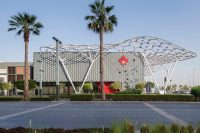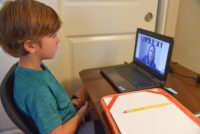Ahead of its 18th edition, Brand Director Sarah Palmer shares how GESS Dubai 2025 will focus on hands-on learning, innovation and real impact, evolving to match the changing needs of today’s educators and learners
Nov 10, 2025, Dubai: Global Educational Supplies and Solutions (GESS) Dubai is one of the flagship events within the GESS portfolio and has been the focal point for education in the Middle East. GESS Dubai 2025 will host 300 global education brands from more than 35 countries around the globe.
As the 18th edition approaches, the event is poised to reflect the swiftly evolving priorities of education across the GCC. For Brand Director Sarah Palmer, the upcoming show is not simply another exhibition; it is a conscientious response to the demands of a sector defined by rapid technological advancement, shifting learner-needs and a renewed emphasis on well-being and sustainability.
This year’s edition places a spotlight on three interconnected themes: interaction, innovation and impact. Attendees can expect immersive experiences that go well beyond the static trade-show model. From real-time demonstrations of AI-driven learning tools and AR/VR–enhanced environments to gamified teaching platforms, the event is designed to show how tomorrow’s classroom is already taking shape today. At the same time, specialists will lead discussions on mental-health support, teacher well-being and green-school initiatives, which are topics that have moved firmly into the centre of the education agenda.
In this conversation with Education Middle East, Palmer shares how GESS Dubai has evolved in response to educator feedback, the latest developments in education in the GCC and emerging supply chain trends.
What can attendees look forward to at GESS Dubai this year?
Attendees can look forward to a truly immersive three-day experience from November 11-13, 2025, at the Dubai World Trade Centre. This year’s edition is all about interaction, innovation and impact.
For the first time, Global Educational Supplies and Solutions (GESS) Dubai will be co-located with Education Investment MENA, creating an incredible platform that connects the worlds of education investment, funding and market growth. Visitors can expect to see cutting-edge technologies take centre stage — from AI-driven learning solutions to AR/VR experiences and gamified teaching tools redefining classroom engagement.
Beyond technology, this year also brings a strong focus on well-being and sustainability. Dedicated zones will highlight mental health, teacher well-being and the growing movement towards greener, future-ready schools. The Leaders in Education Conference will once again be a cornerstone, offering school principals and senior leaders a platform to share challenges, insights and strategies for driving innovation.
And of course, attendees can explore hundreds of global brands in the Product Showcase, where the latest tools and resources for modern learning will be on display.
When Education Middle East connected with school leaders across the GCC last year on their expectations from the event, one of the suggestions was to expand workshops on the real-world applications of technology in schools. In what ways has this year’s event responded to this request?
We’ve listened closely to the feedback from educators and responded by creating workshops that are much more hands-on and experience driven. This year’s sessions allow teachers to see, touch and test technology in action.
For instance, we’re featuring immersive AR/VR learning environments that demonstrate how classrooms can be transformed into interactive, experiential spaces. Educators will also get to explore AI-powered tools that deliver adaptive learning, automated assessments and personalised feedback for students.
Gamification and esports will also play a big role this year, helping schools understand how to use these platforms to boost engagement and nurture essential 21st-century skills. The idea is to give every educator something practical they can take back to their classrooms and implement immediately.
Another suggestion by principals last year was to include more structured networking opportunities to help education leaders collaborate. How does this year’s programme reflect the feedback?
Networking has always been at the heart of GESS, but this year we’ve made it even more purposeful. Principals and school leaders told us they wanted more opportunities for collaboration, so we’ve introduced facilitated roundtables and peer-to-peer discussions within the Leaders in Education Conference.
We’re also expanding GESS Talks Live and panel Q&As, giving attendees a chance to engage directly with thought leaders and innovators in structured, solution-driven conversations. And beyond the sessions, there will be dedicated networking zones designed to connect school leaders, investors and EdTech providers — the kind of setting where real partnerships are formed and new ideas come to life.
What areas in education are experiencing major changes in the GCC, and what factors are driving this transformation?
The GCC’s education landscape is evolving faster than ever, and we’re seeing transformation on multiple fronts. Digital learning integration is at the forefront with AI, AR/VR and blended learning models becoming increasingly mainstream. This shift is being driven by both technological advancement and a demand for more personalised, flexible learning experiences.
Well-being and mental health have also become central priorities. Schools across the region are now actively developing frameworks that support not just academic success, but also emotional resilience among teachers and students alike.
At the same time, there’s a growing emphasis on curriculum innovation, integrating STEAM education, entrepreneurship and skills that prepare students for the future workforce. And from an infrastructure perspective, sustainability is becoming non-negotiable, with schools redesigning campuses to be more eco-conscious and tech enabled.
All of this is being accelerated by strong government initiatives, rising education investments and an increasing adoption of global best practices that are shaping the region into one of the world’s most progressive education hubs.
What are some of the major trends and challenges in the K–12 supply chain within the region?
There’s been a noticeable shift in the K–12 supply chain towards more digital and STEM-focused resources. Schools are actively seeking tools that promote innovation and interactivity in the classroom. Alongside that, we’re seeing a greater move towards sustainability, whether it’s eco-friendly school materials, green construction, or reducing supply waste.
Many institutions are also embracing digital procurement platforms to streamline operations and vendor management, which is helping schools make smarter, more transparent purchasing decisions.
However, the sector still faces challenges. Coordinating across multiple vendors in different countries can be complex, and managing logistics in such a competitive, fast-growing market requires agility. Schools also have to balance cost pressures with the expectation for high-quality, innovative products, which makes strategic sourcing and partnership even more important.
How is AI transforming education, and what impact is it having on teaching and learning?
AI is redefining education in remarkable ways. One of its biggest strengths is personalisation — adaptive learning platforms that tailor lessons to each student’s pace, strengths and areas for improvement. This allows for a more inclusive and effective classroom experience.
For teachers, AI is becoming a powerful ally. It automates administrative tasks like grading and lesson planning, freeing up more time for meaningful engagement with students. AI-driven analytics also help educators identify learning gaps early and provide targeted support.
On a broader scale, AI is enriching the learning journey through simulations, immersive experiences and gamified platforms that make education more interactive and enjoyable. Rather than replacing teachers, AI enhances their role, enabling a more student-centred classroom where technology supports, rather than overshadows, the human connection that defines great education.








